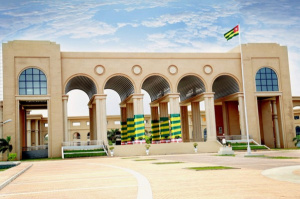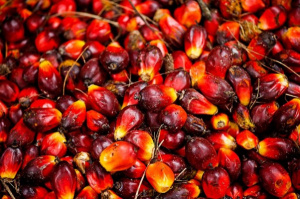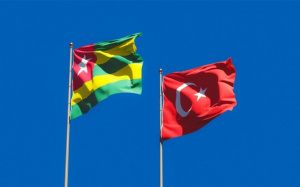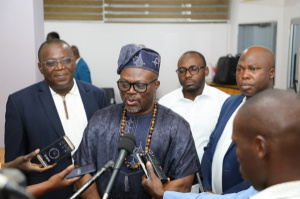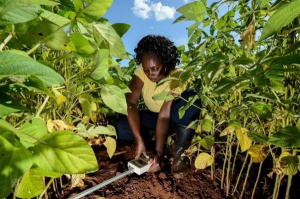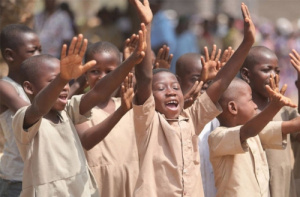Togo First
Togo Takes Step Toward Senatorial Elections
In Togo, the government has taken a significant step toward creating its second parliamentary chamber, the Senate, as mandated by the country's new constitution adopted on May 6, 2024. On November 5, the Council of Ministers issued an ordinance outlining the framework for future senatorial elections.
The ordinance details key aspects of the Senate's organization and function, including the number of senators, their compensation, eligibility criteria, and appointment procedures. It also addresses incompatibilities and methods for filling vacant seats, as well as defining the status of former senators.
This legislative move marks a crucial phase in implementing the bicameral system established by Togo's new constitution. Under this system, the parliament will consist of the National Assembly and the Senate.
The Senate's composition will be unique: two-thirds of its members will be elected by representatives of local authorities, while the remaining third will be appointed by the President of the Council of Ministers (PCM).
The government's initiative to revise the 2003 organic law is necessary to align with the Senate's new roles under the Fifth Republic. Article 98 of the new Constitution permits the adoption of such provisions by ordinance to facilitate the establishment of these new structures.
Before implementation, the ordinance will be submitted to the Constitutional Court for review.
Esaïe Edoh
Togo Launches Semi-Industrial Red Oil Plant in Yoto 2 commune
A semi-industrial plant for producing red oil and palm kernel oil is being built in Tchékpo Dédékpoè, a town of the Yoto 2 municipality (70 km from Lomé). The project officially began on November 5, 2024, according to Agence Togolaise de Presse, a local media.
The plant is the fruit of a partnership between Yoto 2 and Morocco. This project is funded through the Fonds Africain d'Appui à la Coopération Décentralisée Internationale (FACDI), as part of a strategic partnership with Tangier. The construction is expected to take three months.
The new plant will feature a mini-solar power facility, a methanizer, and an integrated production system capable of initially producing 500 liters of oil per day, with potential for expansion based on local demand. The region is well-suited for growing red palm.
The facility aims to utilize renewable energy and biogas, contributing to a reduction in carbon emissions and enhancing the region's energy resilience. It will help boost local resources, create jobs, and stimulate the economy.
The project aligns with Yoto 2's Communal Development Plan (PDC) and Climate-Energy Plan, emphasizing sustainable development.
Esaïe Edoh
Coffee: Togo Wants to Double Its Production by 2030
Togo eyes a coffee output of 50,000 tons by 2030, twice the current production. The target was revealed during the November 5 Council of Ministers which approved two key decrees relating to the coffee sector.
The first decree approves a new agreement with the Inter-African Coffee Organization (IACO), aimed at enhancing coffee production, processing, and trade. The second decree pertains to Togo's accession to the 2022 International Coffee Agreement, which was adopted in Bogota, Colombia.
From 2013 to 2023, Togo’s coffee output has grown from 10,950 tons to 27,336 tons. The government's primary objective is to ensure fair revenues for coffee producers and equitable profit distribution throughout the supply chain.
A statement from the Council emphasized that "the priority remains the sustainable improvement of producers' living conditions and the profitability of the sector for all players in the chain." This underscores a commitment to creating a professional and competitive coffee industry that generates wealth and decent jobs, particularly in rural areas.
To achieve these goals, Togo plans to focus on professionalizing the coffee sector, enhancing living standards for producers, and increasing investments. The Council of Ministers said that “Togo's approval of the new [Bogota] Agreement paves the way for the adoption of appropriate strategies to support the production, marketing, processing and local consumption of coffee, on the one hand, and to improve the living and working conditions of producers through increased exports, on the other.”
To meet its 2030 target, Togo will need about $19.5 million in investments as outlined in its Coffee and Cocoa Sector Development Plans (PDCC). The document has been under development for several months.
Ayi Renaud Dossavi
Afriland First Group to Launch Investment Subsidiary in Togo Soon
Afriland First Holding (AFH), an investment company and subsidiary of Afriland First Group, could soon start operations in Togo. The group’s owner, Paul Fokam, confirmed the possibility on November 1. The Cameroonian billionaire said so during a meeting with Togolese President, Faure Gnassingbé, in Lomé.
AFH will operate across West Africa and focus on acquiring stakes in various companies and investment projects. In addition to equity investments, AFH will provide consultancy and support services in various areas, such as administration, commerce, accounting, human resources management, and technology.
Afriland First Holding (AFH) has been registered at the Business Formalities Center (CFE) since September 2022, with a capital of CFA100 million. It is AFG’s first subsidiary dedicated solely to investment.
Paul Fokam explained that Togo was chosen as the headquarters for this branch due to the government’s vision to create an environment conducive to wealth creation for all. “We’re here to support the President in his fight to share wealth more effectively among the various strata of the population,” he stated.
Christian Fogaing Kammogne, Fokam’s son, will lead the new subsidiary, according to the CFE.
Based in Geneva, Switzerland, Afriland First Group is expanding its banking network with subsidiaries in France and China. The group is also present in Benin through CCEI-Bank and in Guinea Conakry with Afriland First Bank Guinea.
Esaïe Edoh
Togo to Host Turkish Economic Mission Alongside Aného International History Festival
A Turkish economic mission will visit Togo starting November 15. This was announced by the Turkey-Togo Economic Council, through a note from the Turkish Foreign Economic Relations Board (DEIK), as reported by various national media outlets. Abide Gülel, President of the Turkey-Togo Business Council, said the mission will include institutional visits, bilateral meetings, and networking sessions to explore economic cooperation between the two countries.
The mission will coincide with the Aného International History Festival (FIHA), where Turkey is the guest of honor. “We are planning a private sector delegation program for the cities of Aneho and Lomé in Togo between November 15 and 19, 2024. As part of this program, institutional visits, bilateral business meetings, and networking meetings will be organized to assess economic cooperation and investment opportunities between Turkey and Togo,” said Gülel.
According to Agence Anadolu, $7.721 billion worth of investment opportunities are associated with the upcoming mission. “With projects worth $7.721 billion, European, Chinese, and Turkish companies are offering a major investment opportunity in Africa. What's more, all these projects are guaranteed by the State,” added another source quoting Gülel.
The economic mission aims to engage Turkish businesses in sectors such as steel, healthcare, construction, infrastructure, building materials, food and agricultural production machinery, information technology, and banking.
Ayi Renaud Dossavi
Togo: Government Wants to Streamline Building Permit Process
The Togolese government wants to improve the issuance of building permits and strengthen the Construction Inspection Commission(CITC). The Ministry of Urban Planning, Housing, and Land Reform held a workshop with this focus on November 3, 2024.
The meeting included various stakeholders, such as the Ministries of Territorial Administration and Security, and construction professionals. The goal was to address challenges related to unregulated construction that threaten safety and urban development in the country.
Participants discussed ways to enhance access to building permits and agreed on the need for a digital system and better collaboration among relevant departments. Akidjetan Kossi Makissè, President of CITC, noted that only a licensed architect can design a project to ensure quality and compliance.
This initiative aims to regulate construction projects more effectively and improve living conditions in Togo while preventing disasters. The meeting followed a deadly accident on October 18, 2024, when a building under construction collapsed in the Sagbado district of Lomé.
Ayi Renaud Dossavi
Lire aussi:
Agriculture: Togo Trains Stakeholders on Product Certification
A training workshop for agricultural product certification opened on November 4, 2024, in Lomé, Togo. The event aims to improve certification procedures in the agricultural sector and is organized by the High Authority for Quality and the Environment (HAUQE) in partnership with the Togolese Accreditation Committee (COTAG) and the West African Food System Resilience Program (FSRP-Togo).
Over six days, participants will learn how to certify products according to ISO 22000 standards. 35 people involved in certification are attending the training. The latter covers cover international standards for product validation and sampling techniques based on Acceptable Quality Level (AQL).
Koffivi Lakoussan, General Manager of COTAG, stated, “This training of certification players will enable us to implement the food safety management system.” He also urged small and medium-sized enterprises (SMEs) to pursue certification, emphasizing that “ in the current context of the African Continental Free Trade Area (AfCFTA), it is an obligation to comply with standards to be competitive on the market ”.
This initiative is backed by the Food System Resilience Program in West Africa (FSRP Togo), funded by the World Bank. It follows the launch of a standardization process for agri-food products by the Agence Togolaise de Normalisation (ATN) last October.
Esaïe Edoh
Lomé Hosts Regional Workshop on Nuclear Security Management
Lomé is hosting a regional workshop focused on the response to nuclear security incidents at facilities. The five-day workshop kicked off on November 4. Co-organized by the International Atomic Energy Agency (IAEA) and Togo, it aims to develop strategies for preventing, detecting, and responding to threats related to nuclear and radioactive materials.
Participants-national and regional experts-are exploring new methods for handling nuclear security events, whether involving materials in storage or in use. The experts are also looking at real case studies, doing practical exercises, and sharing their experiences, to enhance coordination among various stakeholders in nuclear safety.
At the opening ceremony, Wotobe Kokou Marin, Secretary General of the Togolese Ministry of Health and Public Hygiene, emphasized that nuclear safety is a government responsibility that protects society and the environment. He pointed out that in today's global context, particularly in Africa, the risk of criminal or unauthorized use of nuclear materials cannot be ignored.
Marin noted that as many African countries pursue peaceful applications of nuclear science and technology to bridge the technology gap, the number of nuclear facilities on the continent is expected to increase. This growth brings a heightened risk of nuclear safety incidents. "We need to be even more prepared than countries that have had these technologies for several decades and are certainly already prepared," he said.
Since becoming an IAEA member in 2012, Togo has strengthened its institutional framework by establishing the Autorité Nationale de Sûreté et de Sécurité Nucléaire (ANSSN) in 2020.
Togo Hosts 5th International Fair of Banks and Enterprises
The fifth International Fair of Banks and Enterprises (Salon International des Banques et des Entreprises orSIBE) opened today in Togo. Hosted at the Exhibition and Trade Fair Center (CETEF Togo), the fair ends on November 9. This year’s theme is “The Role and Impact of SMEs in the Economy of WAEMU countries.”
The SIBE aims to serve as a hub for business, emphasizing skill transfer and partnership development between financial institutions and economic operators, both national and international.
The event will include exhibitions, banking and business days, conference debates, and business meetings. Organized by Image Consortium, the SIBE seeks to boost the Togolese economy, enhance banking coverage, and attract foreign investment.
Last year, the fair attracted around 1,000 participants from various sectors including banking, microfinance, financial institutions, insurance, and SMEs.
Financing Africa: Togo Ranks Fifth in Africa for Education Quality
In Africa, Togo ranks fifth among countries implementing the United Nations' MDG 4, which focuses on ensuring access to education for all. The country was ranked in the Mo Ibrahim Foundation's “Financing Africa” report. This document assesses African countries’ financing needs to achieve development and climate goals.
In West Africa, Togo ranks second, scoring 80.1 points. It trails behind Ghana, which scored 84.5 points and surpasses countries like Cape Verde (78.6), Gambia (51.5), Benin (57.3), Senegal (31.7), and Nigeria (38.8).
Togolese authorities view this score as a recognition of their efforts in educational reform, including introducing free basic education and enhancing school infrastructure. However, the score also highlights the challenges that remain to meet the standards of higher-ranked countries.

